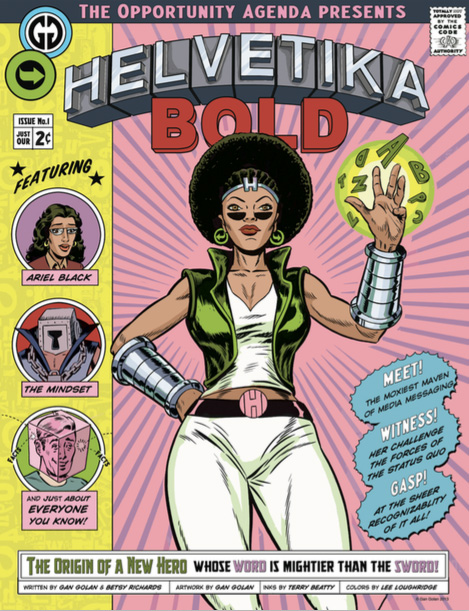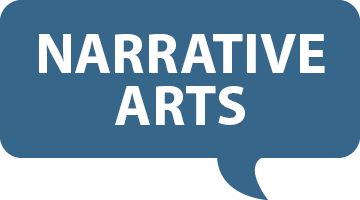How can we piggyback on pop culture?

Credit: The Opportunity Agenda
I spend a fair bit of time every day watching—or thinking about watching—cat videos and movie trailers. In other words, the kind of stuff that advocates like you (and me!) don’t want me watching. You’d rather I spend time on your important issues, like health care or human rights. Maybe you can have it both ways—by piggybacking on pop culture to carry messages about your issue.
Redirect people’s energy for pop culture in service of social issues.
The Harry Potter Alliance doesn’t hector readers of the best-selling books to stop wasting their time on such fluff and instead pay attention to important issues. Rather, they redirect fans’ energy to take action on problems that might concern a real-life Harry, like child slavery or Wal-Mart’s labor practices. And through its Imagine Better Project, the group is applying that same idea to other pop-culture phenomena. They energized fans of the 2013 Superman movie to work on immigration reform, for example, given that the hero is an undocumented immigrant from the planet Krypton. “I call it ‘cultural acupuncture,’” says HPA founder Andrew Slack. “We look for where the energy is in the culture and try to redirect it to heal the body politic.”
Reveal or magnify the political side of a pop-culture phenomenon.
The 2011 Hollywood film The Help was about a group of African-American maids serving white families in 1960s Mississippi. Some considered the movie politically regressive; all the more remarkable, then, that the National Domestic Workers Alliance capitalized on public interest in the Oscar-nominated film with a campaign called Be the Help. That campaign invited moviegoers and others to help improve legal protections for the 2.5 million domestic workers in the U.S. The campaign included Oscar-watching parties nationwide, video stories of domestic workers, and social-media outreach; and it garnered coverage in pop-culture media such as Entertainment Tonight. Or take a look at how a parody video called “Black to the Future,” imagined what might happen if a black character from the popular film series visited the future.
Use pop-culture forms to create your own social-justice stories.
Piggybacking on pop culture doesn’t always mean leveraging existing books or films or other stories. You can also use larger themes and forms in the culture to create your own stories. The Opportunity Agenda seized on Americans’ enduring love of superheroes and created Helvetika Bold—a comic-book superhero who uses powerful words to break the grip of villains like Mindset and his weapon, “the dominant narrative.” Helvetika represents the power each of us has to change the world through language and story. (Read a hilarious Q&A with Helvetika about social-justice communications.)
Superheroes are just one current in pop culture among many: Bamyan Media creates reality-TV series about social entrepreneurs—first in Afghanistan and now in Egypt—to popularize social causes, connect entrepreneurs to resources, and help create social-sector jobs for marginalized young people. A pair of Senegalese rappers “set the news to a beat and viewership soars,” reports the Open Society Foundations; follow Journal Rappé on YouTube or Twitter. Superheroes, reality TV, and rap are just a few currents in pop culture; what could your group do by harnessing video games or adorable cats?
Team up with artists or storytellers to boost your pop-culture quotient.
You may not have the expertise—or deep knowledge of the latest TV shows—to do substantial work in pop culture. Tap your network or your local art school or writing center to recruit some help creating a pop-culture-engagement strategy. You might create an artist- or storyteller-in-residence position to help you interpret your issue through the lens of pop culture. The Opportunity Agenda guide Spoiler Alert: How Progressives Will Break Through With Pop Culture, offers tips on working with creatives, including: “Allow artists to lead the creative process…or the results may be just flat-out bad art, or, at best, a ‘pretty’ version of campaign talking points.” Be sure to talk with storytellers about roles and expectations up front.
Learn from the desires and impulses that underlie pop culture.
Stephen Duncombe’s brilliant book Dream: Re-imagining Progressive Politics in an Age of Fantasy encourages readers toward a dreampolitik to imagine justice and channel popular energies to achieve it. Progressives, he writes, have become too wedded to reason—and neglected the importance of culture and fantasy. “If culture stays, and sells, it means that it somehow resonates with the popular will,” Duncombe writes. “And anyone interested in democratic politics ignores such enthusiasm at his or her peril.”
Duncombe explores the impulses and desires behind such pop-culture phenomena as Las Vegas (spectacle), video games like Grand Theft Auto (rebellion), advertising (transformation), and the allure of celebrity (to be recognized and appreciated). The desires for spectacle, rebellion, and transformation are not destructive on their own; progressives can channel them toward a more just future. For example, the group Billionaires for Bush, which satirizes the influence of big money in politics, appreciates the need for spectacle. Duncombe is co-director of the Center for Artistic Activism and co-creator of that group’s Actipedia, a wiki of creative activism.
Beware of pitfalls.
Piggyback too much and you may lose focus or get mission drift. Tying yourself too closely to a passing fad could result in a waste of resources. Or if you link up to a pop-culture phenomenon that ends up attracting lots of negative attention, you could get tarnished in the process.
Further exploration:
- Spoiler Alert: How Progressives Will Break Through With Pop Culture, 2014, by Tracy Van Slyke for the Opportunity Agenda.
- Dream: Re-imagining Progressive Politics in an Age of Fantasy, by Stephen Duncombe.
- Pop Culture Salvage Podcast, by the Center for Creative Activism, on how the most popular, highest-grossing mainstream culture can be used for good.
- AndAction, an initiative of Spitfire Strategies that alerts nonprofits to upcoming movie and TV storylines on the issues those groups address.
